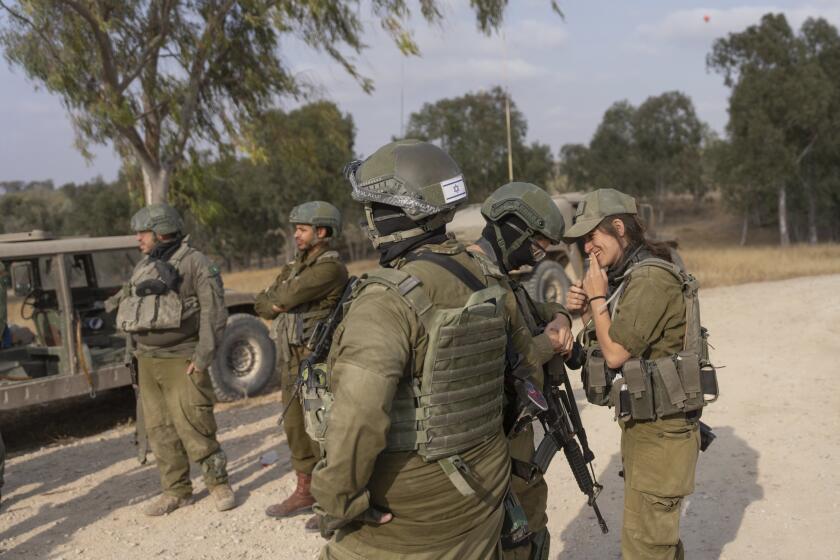Iran, U.S. Disagree Over Goal of Talks
A day after raising international hopes by agreeing to hold direct talks about stabilizing Iraq, U.S. and Iranian officials Friday took a decidedly sharper tone toward each other, differing markedly over the purpose of their planned discussions.
U.S. officials accused Iran of meddling in Iraq’s internal affairs and said the discussions were aimed only at expressing American unhappiness over the interference. In Tehran, a senior official said Iran’s goal in meeting with the Americans was to accelerate the U.S. departure from Iraq.
As differences between the two sides intensified, fears grew that the longtime adversaries were jeopardizing an opportunity to help stabilize Iraq, an effort in which they both have an important stake.
U.S. and Iranian officials fueled expectations for improved relations between the two countries Thursday when each said that teams of officials would meet to discuss Iraq. On Friday, U.S. officials said arrangements were being made by unidentified intermediaries to set a date and place for a meeting.
However, differences began to emerge almost immediately. At first, the Iranians suggested the talks could range more widely, encompassing issues other than Iraq. But U.S. officials quickly rejected that possibility, pointing out they had suggested talks last year only as a way to bring peace in Iraq.
Also Thursday, Iran’s foreign policy chief, Ali Larijani, said Tehran had accepted “the proposal to help resolve the problems in Iraq and establish an independent government there.”
U.S. officials retorted Friday that the talks would be held to discuss “unhelpful Iranian activities in Iraq,” including, they alleged, allowing the shipment of components for roadside bombs used in Iraq and sending Iranian military agents into the country.
“These concerns are well known and we have talked about them,” the U.S. Embassy in Baghdad said in a statement, adding that “Iraqis will decide the future of Iraq.”
U.S. Secretary of State Condoleezza Rice, in Australia, said the talks would be limited in scope, and cast doubt on whether they would take place.
“We will see if and when those talks take place,” she said.
The inability of Washington and Tehran to agree on the subject of the talks gave rise to concerns that any meetings would be fruitless, ending in acrimony and heightening tensions between the two countries.
“If the Americans just plan to yell at them, then this will be about charges and counter-charges, and it won’t be particularly productive,” said Ray Takeyh, a Middle East specialist at the Council on Foreign Relations. “If this is about their common interests, which they do have, then maybe there will be something to it.”
The Iranians can’t afford to let Iraq descend into civil war, Takeyh said, because the conflict would spill across their border. In contrast, an Iraqi democracy would give power to a Shiite Muslim majority whose leaders have close ties to Iran. The agreement to meet reflects that, even as they continue to trade harsh denunciations, the two sides have been forced to recognize that they must work together to stabilize Iraq, he said.
But President Bush’s national security advisor, Stephen J. Hadley, charged Friday that Iran’s agreement to talk about Iraq was probably a ploy intended to head off adverse action by the United Nations Security Council, which is considering ways to address concerns over Tehran’s nuclear program.
“What is interesting is that the Iranians would choose now, at this moment, in such a very public way, to embrace this idea and try to expand it to a negotiation about a broader set of issues,” Hadley told a group of reporters. “The concern, therefore, is that it is simply a device by the Iranians to try and divert pressure that they’re feeling in New York, to try and drive a wedge between the United States and the other countries with which we are working on the nuclear issue and, if you will, divert pressure and divert attention.”
Takeyh agreed that talks between U.S. and Iranian officials could ease pressure to act against the Tehran government.
“This could take all the air out of the Security Council effort,” he said.
In Tehran, meanwhile, Larijani said Friday that Iran’s motivation had nothing to do with the case before the Security Council.
“Iran’s motive behind assistance to the Iraqi nation is helping establishment of lasting security in Iraq, and helping it get rid of the occupiers’ tyranny ... and there is no other hidden issue in that connection,” he said, the official news agency IRNA reported. “At present there is no connection between the issue and Iran’s nuclear case.”
Zalmay Khalilzad, the U.S. ambassador to Iraq, stressed Friday that a stable Iraqi government was a key U.S. goal, but that it would be up to Iraqis to form it -- without Iranian interference.
“We won’t negotiate with Iran over that,” Khalilzad said in an interview on Al Arabiya television. He said any talks would concentrate on U.S. concerns about Iran’s involvement in Iraq.
“We’ll just express concerns with aspects of Iranian policy destabilizing Iraq,” he said. “Iraq can rely on itself. We have serious concerns on aspects of Iranian policy that we will raise.”
More to Read
Start your day right
Sign up for Essential California for news, features and recommendations from the L.A. Times and beyond in your inbox six days a week.
You may occasionally receive promotional content from the Los Angeles Times.







